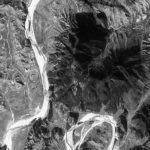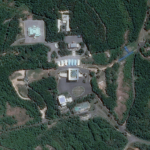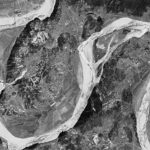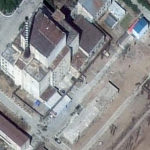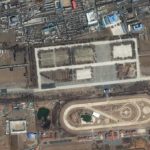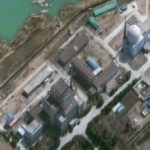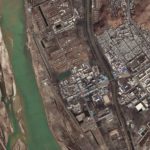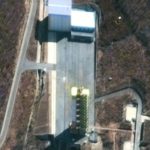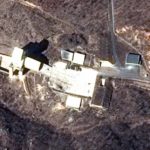July 18, 2019, by Joseph S. Bermudez Jr.—
Acquired almost two years after the image provided in Yongbyon Declassified Part III (February 11, 1966), this December 10, 1967 image of the Yongbyon Nuclear Research Center is one of the first acquired by the improved reconnaissance KH-4B. Among other improvements, the resolution of the newer KH-4B was 1.8 meters versus 2.7 meters of the earlier KH-4A allowing for considerably better image quality.
July 2, 2019, by Victor Cha and Joseph S. Bermudez Jr.—
As the first sitting president in U.S. history to step into North Korea, Donald Trump’s action could be seen as a significant representation of the U.S. intention eventually to conclude a peace treaty... As the first sitting president in U.S. history to step into North Korea, Donald Trump’s…
June 20, 2019, by Joseph S. Bermudez Jr.—
Acquired seven months after the image provided in Yongbyon Declassified Part II (August 23, 1965) this 2.7-meter resolution image covers the Yongbyon area on February 11, 1966. While the general area remains primarily engaged in agricultural activity typical of rural North Korea during the 1960s, significant construction activity is observed at the nascent Yongbyon Nuclear Research Center and adjacent village of Sang-dong.
April 18, 2019, by Joseph S. Bermudez Jr. and Victor Cha—
April 15 railcar movement observed in Airbus satellite imagery at North Korea's Yongbyon facility provides no further understanding concerning the presence of these specialized railcars other that their probable use for the movement of radioactive material.
April 16, 2019, by Joseph S. Bermudez Jr. and Victor Cha—
DigitalGlobe satellite imagery of North Korea’s Yongbyon Nuclear Research Facility acquired on April 12th shows the presence of five specialized railcars near the Uranium Enrichment Facility and the Radiochemistry Laboratory.
In the past these specialized railcars appear to have been associated with the movement of radioactive material or reprocessing campaigns.
April 10, 2019, by Joseph S. Bermudez Jr. and Victor Cha—
On the eve of President Trump’s summit with ROK president Moon Jae-in, commercial satellite imagery acquired on April 7 shows that, although not conclusive, North Korea may be preparing for a parade to honor Kim Il-sung’s birthday (April 15) or KPA Foundation Day (April 25).
April 1, 2019, by Joseph S. Bermudez Jr. and Victor Cha—
Commercial satellite imagery of North Korea’s Yongbyon Nuclear Research Facility acquired on March 28th shows normal operations with a low-level of activity throughout the facility... Beyond Parallel datasets have found that North Korea will engage in provocative acts on average…
March 25, 2019, by Joseph S. Bermudez Jr. and Victor Cha—
Satellite imagery acquired on March 21, 2019 and over the past six months indicates that the No. 17 Explosives Factory near Hamhung is active. While no significant changes have occurred with its infrastructure during this period, the factory was expanded during 2012 with the construction of a large mixing/casting facility capable of producing large solid-propellant rocket motors for ballistic missiles.
March 19, 2019, by Joseph S. Bermudez Jr. and Victor Cha—
While recent activity at the Sohae Launch facility appears to have returned it to operational status after DPRK dismantlement measures earlier in the summer, there has been no activity of significance at the vertical engine test stand or launch pad since early March.
March 9, 2019, by Joseph S. Bermudez Jr. and Victor Cha—
Commercial satellite imagery acquired on both March 6 and March 8, 2019, shows that North Korea has continued preparations on the launch pad and the vertical engine test stand at the Sohae Launch Facility. Based on past practices, these activities could be consistent with preparations for the delivery of a rocket to the launch pad or engine to the test stand; or, they could be North Korean coercive bargaining tactics after the failed Hanoi summit.
